"Once, one of the greatest civilizations of the Universe, now concealed in the outskirts of what used to be our mighty empire. We will come back, we will be taking what is ours and be the greatest again as we were destined to be by the Gods themselves. (Da, ek auki He'ke Obe, serep lalebiku taatak auni Oroki. Kuhu tokanika, kuhu ineka taateke kuha ni duki auki nebep kuhu dek tiraseku duki uto Ka'ree)" - Speech of War, made by General No'rekira Laka'beri .
The Obi'ka are an alien species, native to Telusia, known to them as Maka'bi, and they are the race known to Humans as the Telusians, the species that created the Telusian Civilization. The current Obi'ka existing today are the survivors from the fall of their old civilization. So the Obi'ka today are slightly different in appearance and culture than their former ancestors who created the powerful Telusian Civilization.
They left Avana, where they originated from, and travelled all the way to the solitary Zudya Galaxy to scape the disintegration of their civilization and the extinction of their species. Here, they managed to rebuild their civilization once more, into a new nation called the Obi'ka Ke'Tar. This nation has still not made contact with the Intergalactic Council nor any human nations to date.
The Planet they first settled after the evacuation was known as Teka'bi, and is now the capital and their homeworld..
Characteristics[]
The Current Obi'ka are slightly different from those in the Telusian civilization. They pretty much consider themselves the normal evolution of their species through time, since they did not have a massive interruption of their culture and civilization, like the one suffered by the Kiran or other descendants species of the Obi'ka from the Telusian Civilization Era.
They still have very common features, such as their harsh lizard-like exoskeleton, their brilliant eyes, and the strength. They have two arms and one pair of massive agile legs that permitted them from running heavily after prey on the lands of Maka'bi (Telusia). Their arms were made to jump and climb into the vegetation as well as manipulating the meat from the hunt, and destroy their prey.
Their range of vision was extended into U.V light and the infrared, later on, they developed color vision as well, so to see the colors of their peers used formatting and attraction for reproduction. Their blood is warm and is red, although with a slight orange tone to it.
Reproduction[]
Sexuality in Obi'ka society is similar to human sexual reproduction. The Obi'ka have two genders, female and male, as humans do. They reproduce through a pheromone system, but they are actively reproductive all year long. The Scent of females is however predominant during one period of the year known as "Bik'arbi", in which males would be drawn towards the female as they aren't during the rest of the year, in most cases (but not always; for example with genes are not compatible).
Reproduction is likely then to occur and the Female would lay one, two, or three fertilized eggs. If the mating does not occur, the female would lay unfertilized eggs that are dispatched in a ceremony. During the "Bik'arbi" season, married females are set to be secluded at their homes.In ancient times, polygamy was the norm, but in modern times, Obi'ka had become more monogamous to prevent problems with polygamous marriages that contributed to several conflicts in the past. Most notably related to inheritance, betrayal, revenge, and power.
The female carries the eggs within the Womb and they lay them right at the moment when they will be broken by their offspring. They only have two to three eggs per "pregnancy". The eggs are to hatch hours after being laid.
In Obi'ka culture, the female retires to a room with close relatives, a priestess of Kata'kabi, which usually has labour knowledge. Here the female lays a couple of eggs usually, but three or one are not rare. The eggs are taken from the female and put on a ceremonial nest. Then a ceremony of the Hatching takes place known as Leka'na Ot'ari. The entire family usually includes itself with the eggs for the next ours. The priestess of Kata'kabi, goddess of Fertility, Health, Maternity, and Survival is prayed at all times. Once the Hatch begins it is considered a sign of strength and a good start in life as a powerful being if the Obi'ka newborn is able to hatch the egg alone and comes out on his own. Depending on circumstances, the ones unable to come out on their own are and rarely helped. Having to be helped in this process is a mark of shame for an Obi'ka.
As the Obi'ka did in their old Civilization, the offspring were examined and in case it was weak or defected it was sacrificed to the god Ke'kira immediately in a ceremony. If the offspring passed this test, then the Child was allowed to live and was given a name and adopted in the ceremony.
Society and Population[]
The Obi'ka society hasn't changed much in all their vast history, this is due to their adoration of their lost empire, and the like to imitate it in every way they can. The Cast System is still very much in place although the rulers of the Obi'ka nation are no longer an emperor with a Yot'ka, but a council of members from the three top castes.
The Caste of Slaves[]
The lowest of them all, this caste was made by all races that the Telusians had conquered and oppressed like the Yejinki among others and the took with them on their exodus from Avana. Some of these races were saved from extinction. In the case of the Yejinki, they were considered the Higher class of slaves, often living better standards of living than the Caste of Farmers, Servants, Artisants and the Merchants. A giftly talented Yejinki was considered expensive and valuable and owned only by the very elite. Some Obi'ka were also slaves, but those of this race in slavery were considered above all else and were into better off occupations, such as domestic care, teachings, and mostly as pleasure slaves, since sex with other aliens was impossible. On the other hand, as long as their expansion progressed in the area, many new races came under the Obi'ka, being very much enslaved.
The Caste of Farmers[]
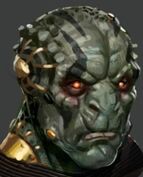
The second-lowest and one of the most populous. They were in charge of food production and cattle. They inhabit most of the planets of the Obi'ka Ke'Tar nation. From the Capital to the outer colonies. Their task is to produce goods for the nation to survive. They are also experts in scientific fields related to Agriculture and Biology, raising new seeds and plants, analyzing the potential of new crops and meat production. They usually are among the bulk of the settlers sent to a new planet to build a colony and are usually very religious. Before the evacuation, this caste was mostly uneducated, but now education of this class is promoted with better results for the entire society.
The Caste of Servers[]
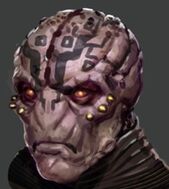
They were the third-lowest and were among the most populous. They were used in restaurants, offices, administrative task, etc.. This caste is mostly based on urban centers and are in charge of providing most of the small shop distribution in the nation, administrative tasks, and manage most of the service-related businesses.
Artists are also from this caste, such as dancers, singers, painters, and musicians but still considered very high in their society. The Ancient Telusian Poetic register is the main language used by the artists.
The Caste of Artisans[]
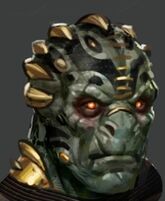
They were among the most populous. They were in charge of manufacturing most of the goods. They build most of the products needed by the population, such as clothes, tools, decorative items, recipients, etc...Smiths come from this caste, as well as most of the military production and designers. They are also among the field of architects, engineers, and artists coming from this caste (mostly painters and Scultures).
For several millennia this caste has had its secrets and usually, even if among the lower castes, they are heavily revered for their skills and crafts. Many have gained very well known positions throughout history. Most are engineers as well, designing some of the most sophisticated artifacts within the Nation.
The Caste of Merchants[]
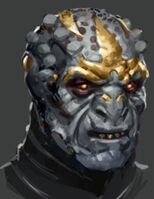
They were in charge of trade and some could be among the wealthiest individuals. They transported most goods between planets and sold them in the numerous markets of the nation. The merchants are in charge of most of the finances of the nation and although they aren't one of the largest castes, they are few. Their influence touches most of the layers of the Obi'ka society. The banking system is mostly directed by this caste, and they can be among very wealthy individuals, but their political power is really diminished. The Merchants have set the human equivalent to human companies and usually are allowed to marry into the higher castes if they have large fortunes. However, most are middle class and not necessarily wealthy.
The Caste of Priests[]
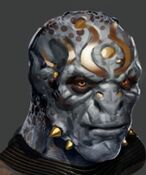
They were among the most prestigious and had immense power in many occasion surpassing those of the Warriors and Rulers since even those castes were a bit higher, they still had to show respect and honor to this one. Several Factions existed, most of which worshipped different Gods and wanted to get favor and prevalence of their deity.
After the evacuation, the god Ta'kar, the god of destiny became prominent, as well as the Four gods of War during the several Wars against the Federation of the Three Races and the other species in the galaxy.
The Caste of Warriors[]
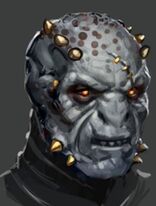
They were many individuals in this caste and was the most populous among the high top three castes. They were in charge of conquering other words, bringing slaves, take advantage of the enemy, and defend the country. They had always prestige, like the merchants' caste, but during the Yejinki wars, they became powerful and became the highest caste de facto, and among the three most important demure. The Yot'ka, came among this caste.
The Warriors after the evacuation, have become the strongest power in the Obi'ka Ke'Tar nation. After the several wars of conquest and wars against the other species in their new area, they have won great prestige and power. Some other castes want to gain power over them. The warriors are also in constant search of new slaves.
The Caste of Rulers[]
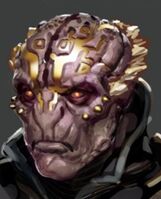
Very little in number, most came from a handful of families, and most could trace their ancestry to the origins of the Telusian Empire or even to some important families from the Early Telusian Era. The Warrior Caste and this caste married each other almost constantly. Especially the Yot'ka. When the Emperor's family died out, the new Emperor had to be elected from this caste, which meant a War among the houses.
With the Evacuation, few families survived, but are regarded as the most prestigious families in the entire Obi'ka Ke'Tar. This caste has the only right to become the Uk'ra of the council.
Religion[]
The Religion is vast and has remained pretty much unchanged. They still worship much of their gods but the pantheon has been enlarged by the contact with new races, incorporating these deities to their pantheons. Some of these examples are seeing in the God known as "E'kara" taken from the worship of the enslaved members of the Ptka species and known in their languages as "Tckara", the God of Wisdom. Most of their older gods remain the same:
- Ato'kira was a water deity that they worshipped as their creator. It was related to Water, rivers, oceans, and any water source. During the Telusian Civilization era, the biggest temple was located in Telusia, in the middle of a Lagoon. Nowadays, the biggest Temple has been built in Teka'bi. This faction of priests is one of the most powerful, as this god is very much prayed by almost all the Obi'ka.
- Ke'kira A god related to death, spirits, sickness, and curses. Weak and defectuous Telusian Offspring were sacrificed to this god.
- Ma'kira: Associated as the Goddess of childhood, medicine, and happiness. Kata'kabi is her nest-sister. She is worshipped on the coming of age of the Obi'ka, and to her, the Obi'ka sacrifice their toys and enter adulthood.
- Kata'kabi: Goddess of maternity, fertility, and survival, mostly survival of the offspring. Its worshipped during the birth of the Obi'ka and is the nest-sister of the Goddess Ma'kira.
- Ta'kar: God of Destiny, Time, and Space. Father of all the Gods and deity of Interstellar Travel. After the Evacuation, it has become the most important deity in the Obi'ka pantheon.
- Ek'orki: One of the Gods of Honor and War. The deity of Duels, Strength, and Overcoming of Hardship, also of Protection against enemies. It's often associated with Power and rights.
- Kul'kira: One of the Goddess of War, God of Justice and Revenge, also the goddess of military discipline. The deity of protection, good luck, and fortune. Somehow also associated with Power.
- Tik'orki: A Goddess of War, Conflict, and Lies, it represented political intrigue, plotting, treason, and poison. Also a goddess of pleasure, it is associated with Power, Self-Enjoyment, Murder, and Revenged.
- Yar'kira: The Supreme God of War, Blood, and Destruction. God of Fire and sadistic rage. It is considered the most brutal side of War and to him are sacrificed many slaves in times of war. Its the oldest of the Gods of War.
- Mis'orki: Goddess of Agriculture
- U'korki: God of Manufacturing, Artisans, and the like.
- Ri'kira: Goddess of Commerce, Trade and Wealth
- Tok'orki: God of the Natural World, creator of the Planets, the Fauna, and the Flora. Considered the protector of souls and the Lord of the Afterlife.
And many more.
